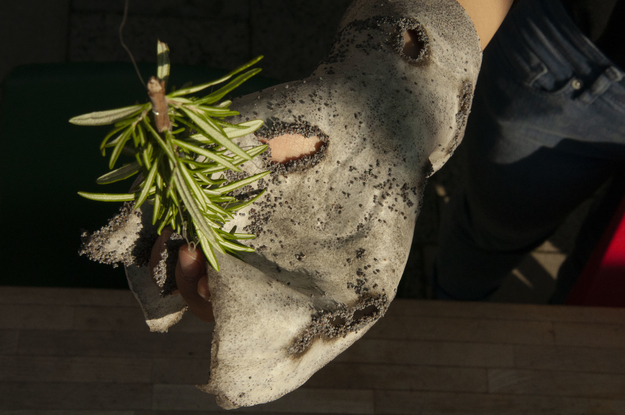This post is about our FIRST impressions of raw tempeh, organic shapes and a crumb of Halloween spirit.
After this silent break, we have decided to separate our update into two different posts. We left the samples of chickpeas, black-eyed beans (“In China we call them eyebrow beans”- Jiwei is yelling to me from the other side of the table), black sesame and poppy-seeds(again!) to grow in the incubator in the very beginning of this week. The bright Thursday’s sun was promising one of the last warm days before imminent mid-autumn, so we abandoned the clean lab to prepare our tempeh samples in the Mediamatic Restaurant.
We are honest with you in this blog, and for that reason, we have to admit that tempeh we have made before have not always had the smell you would be pleased to get a whiff of (usually quite the opposite). But today all the samples smelled like pure mycelium, the smell that already grew on us, and as Jiwei described it: “I kind of like it, I smell and I know it’s normal – it’s food”. However, black-eyed bean, oops, eyebrow bean (sorry, Jiwei!) tempeh gave off the smell we have never had in the lab before. It smelled like a mushroom! Imagine an odor of a dense forest with mushrooms resting in a moss near where your rain boots just left the shoe-print. That’s the smell of the raw eyebrow bean tempeh- our new favourite!
Kamile likes the smell of raw black eye bean tempeh - "Smells like mushroom!"

But let’s leave the smell behind and talk about the texture, form, structure, and Halloween. Halloween? Yes, Halloween. It might be strange for some, but in the Netherlands, every shop is ready for any celebration sooner than a month before. As shops are now full of Halloween merchandise, while staring at these ghostly structures of sesame and white-bean tempeh I can imagine them looking better hanging at your home than any of those boring (aka. always the same) Halloween decorations you could buy at Hema.
Not well-grown white bean tempeh - Maybe because we didn't dehull the white beans

Who knows, maybe in a few years a big sheet of white-bean mycelium is going to be the most desirable and sold out “ghost” costume.
But who cares about Halloween when this beautiful sample of poppy-seed tempeh is resting on your hand. Impressively strong and at the same time flexible, having soft as baby’s bottom texture with an interesting dotted pattern of poppy-seeds drowning in mycelium.
We played with this sample by determining organic shapes defined by our bodies.
Poppy seed tempeh sheet on hand - The poppy seed tempeh flows along the hand nicely

Thinking of how could we use it in our dining experience…
Jiwei pretending to eat something from tempeh sheet -

And how anyone of you would use it...




